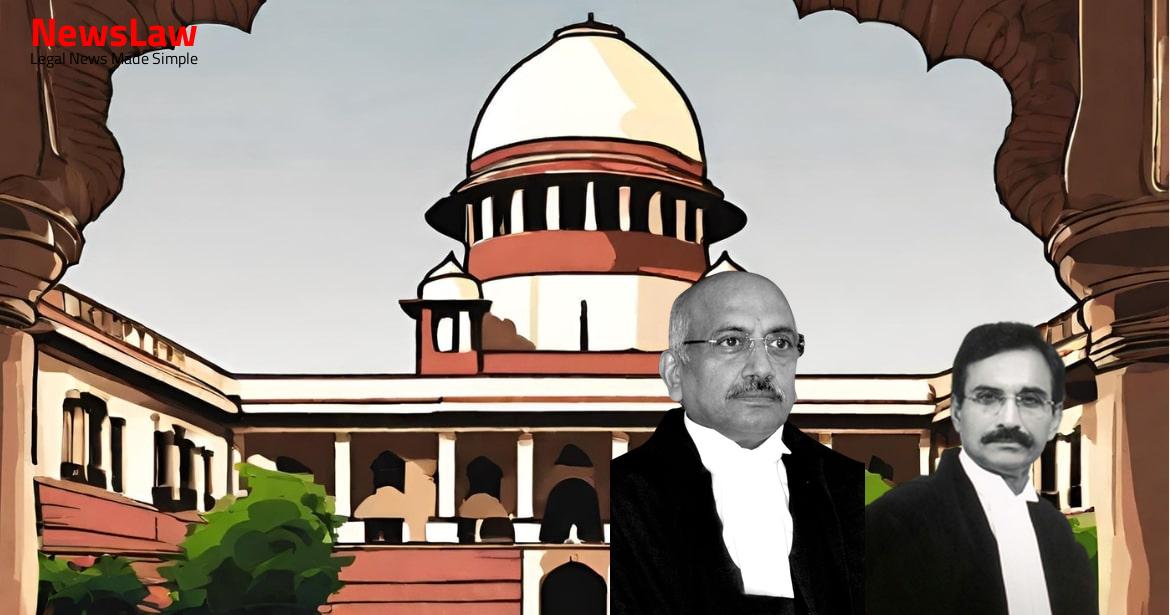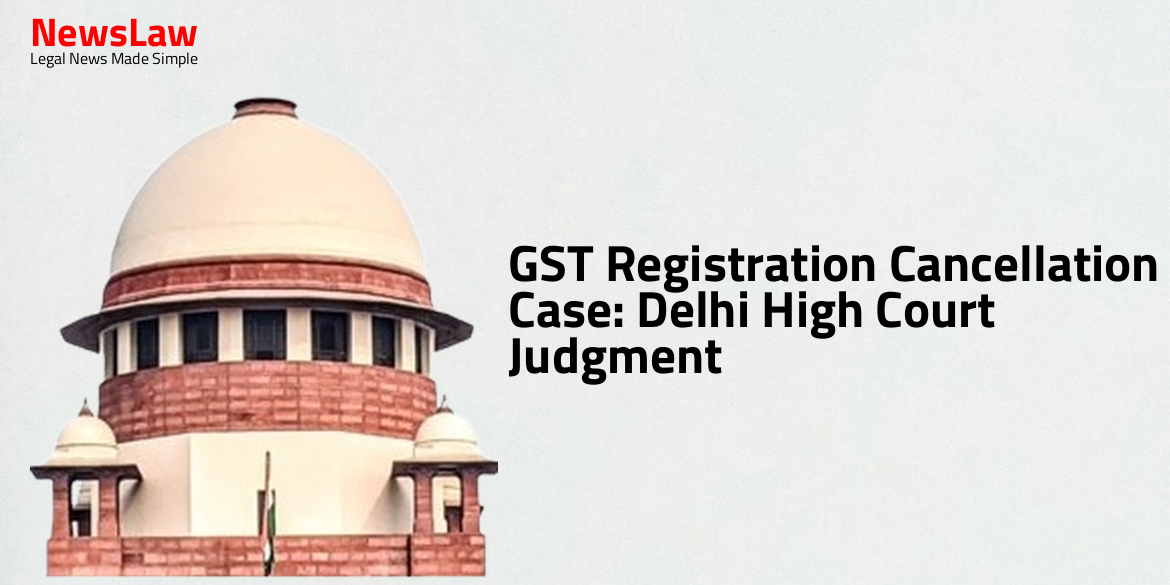In a significant legal battle over land allotment jurisdiction, the Supreme Court of India delivered a key judgment involving the Central Government and the State of Andhra Pradesh. The case revolves around the authority of the Central Government to make allotments to displaced persons post the transfer of land to the state government. The decision carries implications for the management and disposal of compensatory land in accordance with the relevant laws. Stay tuned to learn more about this crucial ruling.
Facts
- The legality and validity of the order passed by the Chief Commissioner of Land Administration, Andhra Pradesh on February 26, 2003, is being considered in the present appeal.
- The father of the appellant, who originally owned 83.11 acres of land in Sindh, applied for 200 acres of land in India in lieu of the land left in West Pakistan.
- After application, 40.4 standard acres of land were allotted in two different villages in District Hyderabad East and Hyderabad West.
- The Revisional Authority dismissed the State’s revision challenging the allotment, stating it was in accordance with the law.
- A writ petition was filed by the State against the allotment, and the High Court allowed the petition, reversing the earlier decision.
- The appellant also filed a writ petition challenging a show-cause notice, which was disposed of by the High Court with a direction to approach the Revisional Authority.
- The allotment of land took place before the Displaced Persons (Compensation & Rehabilitation) Act, 1954, necessitating a letter for regularization after the commencement of the Act.
- The father of the appellant did not make any further claims for additional land after the initial allotment until his passing in 1988.
- Rule 51 of the Displaced Persons (Compensation & Rehabilitation) Rules, 1955 provides a scale of compensation for land allotment based on the area abandoned by the displaced person.
- The appellant made several representations to the CCLA for the allotment of the remaining balance of verified claim, leading to the allotment of 19.26 standard acres of land in February 2003.
- The orders of the CCLA were initially stayed, and suo moto proceedings were initiated by the Revenue Department of the Government of Andhra Pradesh regarding several allotment cases in the region.
Also Read: Lt. Col. Om Dutt Sharma vs. Ministry of Defence: OROP Entitlement for Army Postal Service Personnel
Issue
- The main issue to be examined is whether the Central Government could make allotment to displaced persons after May 24, 1980, upon transferring land to the State Government.
Also Read: Inheritance Dispute: Validity of Alleged Marriage between Sujathamma and Hanumanthappa
Analysis
- The Central Government is competent to constitute any authority or corporation for the purpose of allotment of evacuee property to displaced persons.
- The transfer of land to the State Government was completed on June 1, 1980, subject to specified conditions like the payment of 15% of the realized value to the Central Government.
- Disputes regarding payment between the State Government and the Central Government are not grounds for third party grievances.
- The law mandates the Central Government to compensate displaced persons by allotting land equivalent to what they left in West Pakistan.
- The Act and Rules do not limit the right of a displaced person to seek further allotments of land after an initial allotment.
- The Rules allow for multiple allotments based on verified claims, guided by available land, priorities, and preferences.
- The Punjab government enacted a law for the disposal of surplus evacuee land, showing complete transfer to the State.
- The order of allotment made in 1954 satisfied the appellant’s claim, and subsequent allotments were not entitled.
- The disposal of evacuee property was intended for the rehabilitation of displaced persons from one country to another.
- The Act and Rules provide a framework for compensation through cash or land allotments based on verified claims.
- The repeal of the Act in 2005 clarified pending proceedings to be decided under relevant laws.
- The transfer of land from the Central Government to a State Government is legally supported by the Act.
- All disputes regarding land allotment and transfers should be raised within the prescribed timeline to ensure timely resolution.
- The Managing Officer or Corporation has the authority to transfer property out of the compensation pool based on valuations and regulations.
- Evacuee property forms part of the compensation pool and is subject to management and disposal by the Central Government.
- Verification of property claims and allocation of land in lieu of abandoned areas are key steps in the compensation process.
- Mr. Sibal relied on the order in International Sindhi Panchayats case.
- The process of resettling displaced persons involves specific steps as found in Amar Singh case.
- The claim on behalf of successor-in-interest after the death of displaced person was dismissed in Chameli Devi case.
- The Punjab Act governs the allotment of evacuee land by designated officers.
- The excess land allotted as a package deal cannot be sold according to the Punjab and Haryana High Court in Ram Chander case.
- The Central Government retains control over evacuee property even though authorities are notified to implement the Act as per the argument raised by Mr. Sibal.
- The State Government officers have been entrusted with functions of Managing Officer or Settlement Commissioner for evacuee land.
- The lack of use of the expression ‘package deal’ does not change the nature of transfer as per the decision of the High Court.
- The transfer of land is in accordance with Section 16 of the Act with the specified date of transfer being June 1, 1980 as per Rule 34 of the Rules.
- Section 16(2)(b) empowers the Central Government to constitute an authority or corporation for the management of the compensation pool.
- The Central Government has the discretion to determine the composition and structure of the authority or corporation.
- Such authority or corporation will be responsible for the management and disposal of the compensation pool.
- The Central Government has the authority to decide on the specific functions and powers of the authority or corporation.
- The constitution of the authority or corporation is subject to the discretion of the Central Government.
- Central Government’s right for allotment of land after transfer to State of Andhra Pradesh on May 24, 1980, w.e.f. June 1, 1980, not affected by the order.
- The order does not address the issue raised regarding Central Government’s right for land allotment.
- The transfer of land to the State does not negate Central Government’s authority for land allocation post-transfer.
- The judgment does not restrict the Central Government’s jurisdiction over land allotment despite the transfer to the State of Andhra Pradesh.
Also Read: Seniority Determination in Uttarakhand Pey Jal Nigam: Regulation 23 vs Government Order
Decision
- The present appeal has been dismissed as no merit was found in it.
- The cases and proceedings pending on the date of repeal will be decided under the provisions of the Act.
- The appeal has been consequently dismissed.
Case Title: RAMESH PARSRAM MALANI AND ORS.. Vs. THE STATE OF TELANGANA REPRESENTED BY THE DISTRICT COLLECTOR AND ORS.
Case Number: C.A. No.-007477-007477 / 2019



